Jesse Owens
"He Beat Discrimination with Determination"
World Movers
Jackie Robinson
Joe Louis
Oscar Robertson
Jesse Owens
Other Jackie Sites
Official Site of Jackie Robinson
TIME Magazine-Jackie Robinson
NY TIMES Sound Bits
AFRO-Americ@: Jackie Robinson
Baseball Hall of Fame
Other Joe Sites
Official Site of Joe Louis
ESPN Sports Century Profile
Boxing Hall of Fame
Detroit RearView Mirror
BoxRec-Fight Record
Other Oscar Sites
Official Site of Oscar Robertson
NBA Profile
Basketball Hall of Fame Profile
Espn Sports Century Profile
Other Jesse Sites
Official Site of Jesse Owens
Espn Sports Century Profile
The Jesse Owens Foundation
Additional Sites
Espn Classic
Jim Crow and Sports
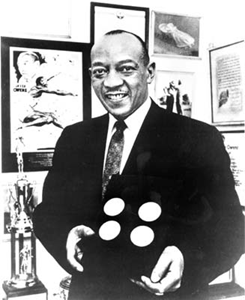
| Biography | Quotes | Achievements | Event That Changed the World |
"It all goes so fast, and character makes
the difference when it's close."-Jesse Owens
Biography
James Cleveland Owens was born in Oakville, Alabama on Sept. 12, 1913. His parents, Henry and Emma, were cotton pickers and by age seven Jesse was expected to pick 100 pounds of cotton a day so that his family could gather enough money to survive. When he was nine his family moved to Cleveland, Ohio in hopes to find a better life, for Jesse that life would come in the world of track and field.
In Cleveland, one of his teachers misunderstood the name J.C. for Jesse and so from that point on James Cleveland Owens was known as Jesse Owens. As the story goes, Coach Charlie Riley 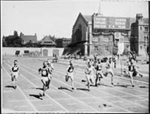 saw him running one day in gym class and asked him to join the track team. The only problem was Jesse needed to work after school and could not practice so special arrangements had to be made. At Cleveland East Technical High School Jesse began making a name for himself. As a senior, he tied the world record in the 100-yard dash with a time of 9.4 seconds. Jesse now faced the problem of picking which college he should attend. Surprisingly enough he decided to go to the Ohio State University and not receive the scholarships some large schools were willing to give him. He worked hard to support him and his wife Ruth while preparing to set track records.
saw him running one day in gym class and asked him to join the track team. The only problem was Jesse needed to work after school and could not practice so special arrangements had to be made. At Cleveland East Technical High School Jesse began making a name for himself. As a senior, he tied the world record in the 100-yard dash with a time of 9.4 seconds. Jesse now faced the problem of picking which college he should attend. Surprisingly enough he decided to go to the Ohio State University and not receive the scholarships some large schools were willing to give him. He worked hard to support him and his wife Ruth while preparing to set track records.
Life on the Buckeye track team for Owens meant he would have to stay at different hotels then his white teammates and eat at different restaurants, every day he experienced racial discrimination and everyday he persevered through it. His best track performance may have been at the 1935 Big Ten Track Championships. In a span of an hour Jesse Owens beat or tied four world records with times of 9.4 seconds in the 100-yard dash, 26"8_" in the long jump and 20.3 seconds in the 220-yard dash. His 22.6 seconds in the 220-yard low hurdles made him the first man to break the 23-second mark. In all he won 42 out of the 42 events he was in during his junior year at Ohio State. This included four in the Big Ten Championships, four in the NCAA Championships, two in the AAU Championships and three at the Olympic Trials. Jesse had won himself a spot on the 1936 Summer Olympic team, and he was ready to race the Nazi's.
The 1936 Olympics gave Jesse the chance to showcase himself. He won all four events he was in and came home with four gold medals. More importantly, his wins were a slap in the face of Aryan Fascist Dictator Adolf Hitler. Jesse returned home to the same world he left. It was full of racism and hate, it was a world Jesse Owens could not improve with his legs no mater how hard he tried.
In order to make money Jesse began racing against animals such as horses. Truly, it was a sad sight to see such a hero given so few opportunities because of the color of his skin. In the 1900's Jesse began a financial stabling job as a public speaker for corporations and organizations. He talked about dedication, religion, and loyalty. He never forgot his roots and always volunteered his time to youth sports organizations for under privileged kids. On March 31, 1980, Jesse died of lung cancer due to his lifetime habit of smoking. Jesse Owens represented everything that is good about this country, faith, courage, and determination, and most importantly patriotism. Jessie Owens was a man who faced many racial road bumps along the pathways of life, luckily for him his speed more than made up for each of them.
Back to Top
Quotes
Back to Top
Achievements
| 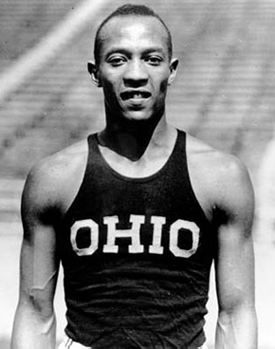 |
Back to Top
The Event That Changed The World:1936 Berlin Olympics
Jesse Owens entered the 1936 Berlin Olympics as "non-human" in the eyes of the host country. The truth was the way he could run and jump, he just might have been beyond humanity. Nazi Germany had planned to display their power on the world stage but Hitler instead would be embarrassed at the hands of the American.
On August 3, Jesse began his four gold medal performance by winning the one hundred-meter dash. Jesse just beat out fellow African American teammate Ralph Metcalfe. Jesse's follow up performance the next day got off to an extremely poor start. Jesse almost missed qualifying for the long jump finals but his stiffest competition Luz Long, a German, decided to help him out. He showed Jesse that he had been jumping too late and he should set a mark on the lane at the point where he wanted to jump. That afternoon Jesse edged out Long for a gold medal. In addition, Long was the first one to embrace Jesse at the medal ceremony. Jesse later stated, "It took a lot of courage for him to befriend me in front of Hitler. You can melt down all the medals and cups I have and they wouldn't be plating on the 24-karat friendship I felt for Luz Long at that moment. Hitler must have gone crazy watching us embrace. The sad part of the story is I never saw Long again. He was killed in World War II." In that one moment humanity was at its best as a white Aryan in Nazi Germany stood up for what he believed in.
With two gold medals in his pocket already, Jesse was ready to add a third. On the 5th of August, Jesse edged out Jackie Robinson's older brother Mack in the 200-meter hurdles. He had captured his third gold medal. 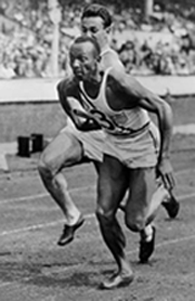 Jesse then was surprised when he was asked to compete in the 4 by 100-meter relay team. Owens and Metcalfe replaced Marty Glickman and Sam Stoller, the only Jews on the track team. It has been speculated that the Germans pressured the US team to do this to avoid getting anymore embarrassed. Jesse came out with his fourth gold medal and the respect of a nation. Hitler on the other hand would not congratulate the American as was custom by host country leaders in that day. Jesse remembers the situation and reflects, "When I came back to my native country, after all the stories about Hitler, I couldn't ride in the front of the bus," Owens said. "I had to go to the back door. I couldn't live where I wanted. I wasn't invited to shake hands with Hitler, but I wasn't invited to the White House to shake hands with the President, either." How unfortunately true it was that Jesse went from one nation with a leader filled with hate to his native land and a nation filled with segregation.
Jesse then was surprised when he was asked to compete in the 4 by 100-meter relay team. Owens and Metcalfe replaced Marty Glickman and Sam Stoller, the only Jews on the track team. It has been speculated that the Germans pressured the US team to do this to avoid getting anymore embarrassed. Jesse came out with his fourth gold medal and the respect of a nation. Hitler on the other hand would not congratulate the American as was custom by host country leaders in that day. Jesse remembers the situation and reflects, "When I came back to my native country, after all the stories about Hitler, I couldn't ride in the front of the bus," Owens said. "I had to go to the back door. I couldn't live where I wanted. I wasn't invited to shake hands with Hitler, but I wasn't invited to the White House to shake hands with the President, either." How unfortunately true it was that Jesse went from one nation with a leader filled with hate to his native land and a nation filled with segregation.
Back to Top
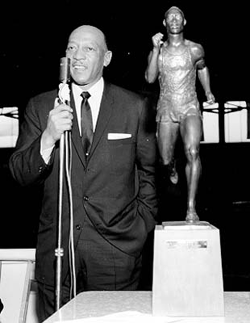 By Jesse Owens
By Jesse Owens